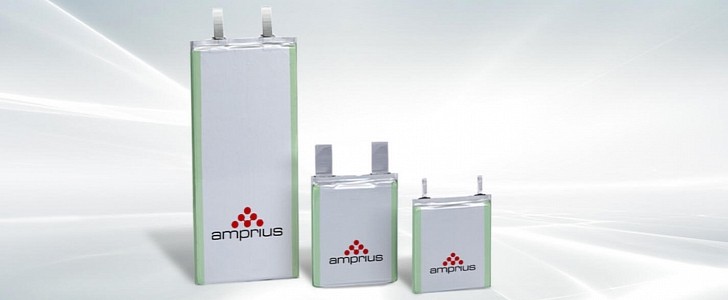Li-Ion batteries are the most important part of electric vehicles and their characteristics literally make or break an EV. One of the most important characteristics is its energy density, or how much energy can be packed within. Although Tesla was considered the king of battery tech, a new startup started commercial deliveries for a new battery type that is twice as energy-dense as Tesla batteries.
Amprius Technologies is a Fremont-based battery specialist that recently delivered its first batch of commercially available lithium-ion cells. These use a special silicone nanowire cathode to improve energy density up to 450 Wh/kg, which at the moment is the highest in any commercially available battery. The new Li-Ion cells are the first of their kind to be deployed commercially and were shipped to an undisclosed maker of High-Altitude Pseudo Satellites (HAPS). In case you were wondering, these are aircraft that stay high in the sky for extended periods, providing satellite-like services.
This is not Amprius’ first attempt at cracking the high energy density Li-Ion battery. Their 405 Wh/kg battery was unveiled just three months ago, and, of course, this rapid advancement means the company will have a 500 Wh/kg in the next couple of months. To put things into perspective, Tesla’s Li-Ion battery offers an energy density of 260 Wh/kg and is considered one of the best in the industry.
The Amprius battery uses a proprietary Si-Nanowire anode technology to directly replace graphite anodes. According to the company, this allows both for higher density but also for higher power, and with a longer lifecycle than regular Li-Ion batteries. Moreover, the Si-Nanowire in Amprius cells allows for extremely fast charging, with a 0 to 80 percent charge in just six minutes.
At the moment, Amprius is working hard to achieve mass production of its cells, with a major ramp-up expected in 2024. The silicone-based cells would prove crucial for the eVTOL industry, as well as for drones for military and commercial applications. We don’t know how expensive the new technology is at the moment, but with proper scaling, it should go down in price to a level that would make it viable for electric vehicles too.
Amprius is not the only company pushing the boundaries of Li-Ion batteries. Not long ago, Sila Technologies announced a similar technology. That was more suitable for small cells like the ones made for wearables, though. Nevertheless, Li-Ion batteries are here to stay and they will become more and more powerful and affordable in the future.
This is not Amprius’ first attempt at cracking the high energy density Li-Ion battery. Their 405 Wh/kg battery was unveiled just three months ago, and, of course, this rapid advancement means the company will have a 500 Wh/kg in the next couple of months. To put things into perspective, Tesla’s Li-Ion battery offers an energy density of 260 Wh/kg and is considered one of the best in the industry.
The Amprius battery uses a proprietary Si-Nanowire anode technology to directly replace graphite anodes. According to the company, this allows both for higher density but also for higher power, and with a longer lifecycle than regular Li-Ion batteries. Moreover, the Si-Nanowire in Amprius cells allows for extremely fast charging, with a 0 to 80 percent charge in just six minutes.
At the moment, Amprius is working hard to achieve mass production of its cells, with a major ramp-up expected in 2024. The silicone-based cells would prove crucial for the eVTOL industry, as well as for drones for military and commercial applications. We don’t know how expensive the new technology is at the moment, but with proper scaling, it should go down in price to a level that would make it viable for electric vehicles too.
Amprius is not the only company pushing the boundaries of Li-Ion batteries. Not long ago, Sila Technologies announced a similar technology. That was more suitable for small cells like the ones made for wearables, though. Nevertheless, Li-Ion batteries are here to stay and they will become more and more powerful and affordable in the future.

